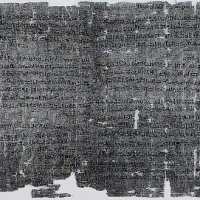Ancient Egyptians were fond of Wisdom Texts – texts that gave advice as to how people should behave, and kings were fond of recording the good laws they had enacted for the betterment of their people, often recorded as edicts on stelae.
Here are a few examples:
Horemheb, the last king of Dynasty 18 (1319-1292 BC), united Egypt after years of troubled internal conflict and massive corruption. In attempting to re-institute a more equitable system of taxation and to reduce corruption, he instituted a number of edicts that were to protect the poor against the more powerful.
Because taxes were paid in goods – primarily agricultural – this policy impacted on the distribution of food crops and beers.
To assure his edicts were carried out, Horemheb also elected a number of lawgivers whose task was to travel about the land, assuring that complaints of the following kind were no more. It is said that these lawgivers were well paid, in order that they, too, would not be tempted to collaborate in local corruption.
Horemheb’s edicts are recorded in the so-called Great Edict of Horemheb, only a portion of which has been discovered on a stela.
Here are some of the passages relating to crops: I’ve cleaned up the text a bit so that it is more readable.
Note:
“L.P.H.” stands for “[May you have] Life – Prosperity – Health!” this is an honorific that follows the king’s name.
James Breasted, Ancient Records of Egypt, Vol. III §§ 50 to 67
His majesty took counsel with his heart [as to how he might] …. expel evil and suppress lying… The scribe of His majesty … seized palette and roll; he put it into writing according to all that his majesty, the king himself, said. He spoke as follows: “[My majesty] commands … concerning all instances of oppression in the land:If the poor man made for himself a craft with its sail, in order to be able to serve the Pharaoh, L.P.H., loading it with the dues for the breweries and for the kitchens of the Pharaoh, and he was robbed of the craft and the dues, … This is wrong, and the Pharaoh will suppress it [the wrongdoing] by his excellent measures. If there be a poor man who pays the dues of the breweries and kitchens of the Pharaoh, L.P.H., to the two deputies, and he be robbed of his goods and his craft, my majesty commands: that every officer who seizes the dues and takes the craft of any citizen of the army or of any person who is in the whole land, the law shall be executed against him, in that his nose shall be cut off, and he shall be sent to Tharu. ……………………….Likewise [for] the collection of vegetables for the breweries and kitchens of the Pharaoh: …. The officials plundered the poor, taking the best of their vegetables, saying: “They are for the impost of the Pharaoh.” Thus they robbed the poor of their labors, so that a double impost was levied [on the poor who were robbed.]. Now, my majesty commands that as for any officials who come to collect vegetables for the impost of Pharaoh, L.P.H., in the arbors, and the …. houses of the estates of Pharaoh, L.P.H., and the [fields?] of Pharaoh which contain vegetables, concerning whom one shall hear, saying: “… for any citizen of the army, or any people, beginning with this day, the law shall be executed against them … “……………………Hear ye these commands which my majesty has made for the first time governing the whole land, when my majesty remembered these cases of oppression which occur before this land.
The following passages are extracted from collections of sayings – pieces of advice, some of which are similar to the ‘Adab’ literature of medieval Arabic, a genre of writing intended to provide instructions on good manners and behavior for the well ‘cultured’ man.
As well, some of the following were used in hieroglyphic classes, to be copied by up-and-coming scribes:
The Instruction of Ankhsheshonq
M. Lichtheim, Ancient Egyptian Literature, Vol. 3, p.176
in:
http://www.nefertiti.iwebland.com
Give one loaf to your laborer, receive two from (the work of) his arms.
Give one loaf to the one who labors, give two to the one who gives orders.
Sennefer, mayor of Thebes, to his tenant, Baki [<file:///E:/workrelations.htm>]
Papyrus Berlin 10463
Reign of Amenhotep II (1450-1412 BCE)
The mayor of the southern capital Sennefer speaks to the tenant-farmer Baki son of Kyson to the following effect. This letter is brought to you to tell you that I am coming to see you when we moor at Hu in three days’ time.
Do not let me find fault with you in your duties.
Do not fail to have things in perfect order. …..
You are not to slack, because I know that you are lazy, and fond of eating in bed.
The Instruction of the scribe Any, New Kingdom
M.Lichtheim, Ancient Egyptian Literature, Volume II, p.143
Do not talk back to an angry superior,
Let him have his way;
Speak sweetly when he speaks sourly,
It’s the remedy that calms the heart.
Fighting answers carry sticks,
And your strength collapses;
///////////////
Do not vex your heart.
He will return to praise you soon,
When his hour of rage has passed.
If your words please the heart,
The heart tends to accept them;
Choose silence for yourself,
Submit to what he does.



























who is accoupi in egypt history
LikeLike
Pingback: Ancient Egyptians | Egypt Blog Review
Pingback: Empire Builder: Ancient Egypt (strategy Game) | Egypt Blog Review